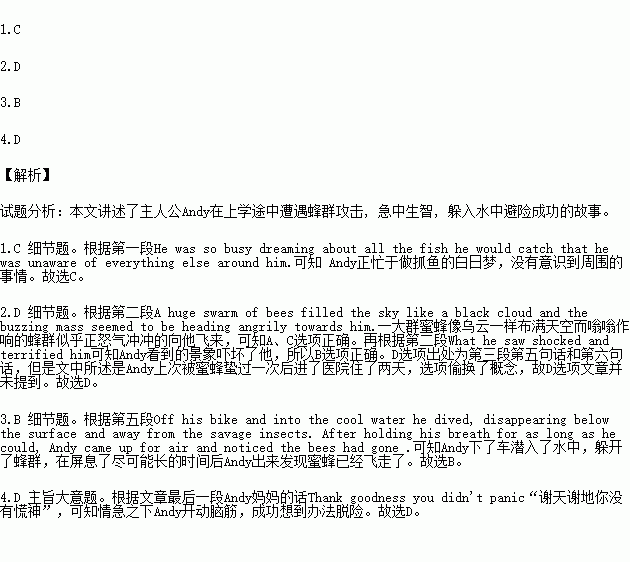题目内容
It was Andy rode slowly on his way to school, day-dreaming about the fishing trip that his father had promised him. He was so busy dreaming about all the fish he would catch that he was unaware of everything else around him.
He rode along until a strange sound drew him to the present. He came to a stop and looked curiously up to the heavens. What he saw shocked and terrified him. A huge swarm of bees filled the sky like a black cloud and the buzzing mass seemed to be heading angrily towards him.
With no time to waste, Andy sped off in the opposite direction, riding furiously—but without knowing how to escape the swarm. With a rapidly beating heart and his legs pumping furiously, he sped down the rough road. As the bees came closer, his panic increased. Andy knew that he was sensitive to bee stings(蜇). The last sting had landed him in hospital—and that was only one bee sting! He had been forced to stay in bed for two whole days. Suddenly, his father’s words came to him.“When you are in a tight situation, don’t panic. Use your brain and think your way out of it.”
On a nearby hill, he could see smoke waving slowly skywards from the chimney of the Nelson family home. “Bees don’t like smoke,” he thought. “They couldn’t get into the house.” Andy raced towards the Nelson house, but the bees were gaining ground. Andy knew he could not reach the house in time. He estimated that the bees would catch up with him soon.
Suddenly, out of the corner of his eyes, he spotted a small dam used by Mr. Nelson to irrigate his vegetable garden. Off his bike and into the cool water he lived, disappearing below the surface and away from the savage insects. After holding his breath for as long as he could, Andy came up for air and noticed the bees had gone. Dragging himself out of the dam, he struggled up the hilly slope and rang the doorbell. Mrs. Nelson took him inside and rang his mother.
“You’ll really need that fishing break to help you recover,” laughed his mother with relief. “Thank goodness you didn’t panic!” But Andy did not hear her. He was dreaming once again of the fish he would catch tomorrow.
1.Why did Andy fail to notice the swarm of bees earlier?
A. He was riding to school.
B. He was listening to a strange sound.
C. He was lost in the thought of the fishing trip.
D. He was going fishing with his father.
2.Which of the following is NOT mentioned about the swarm of bees in the passage?
A. They crowded like a black cloud.
B. They shocked and terrified Andy.
C. They tried to attack Andy in a mass.
D. They made Andy stay in hospital for two days.
3.How did Andy avoid the bees in the end?
A. He asked Mr. Nelson for help.
B. He hid himself under the water.
C. He rushed into the Nelson house.
D. He rode off in the opposite direction.
4.Which of the following can best describe Andy’s escape from the bees?
A. No pains, no gains.
B. Once bitten, twice shy.
C. Where there is a will, there is a way.
D. In time of danger, one’s mind works fast.

